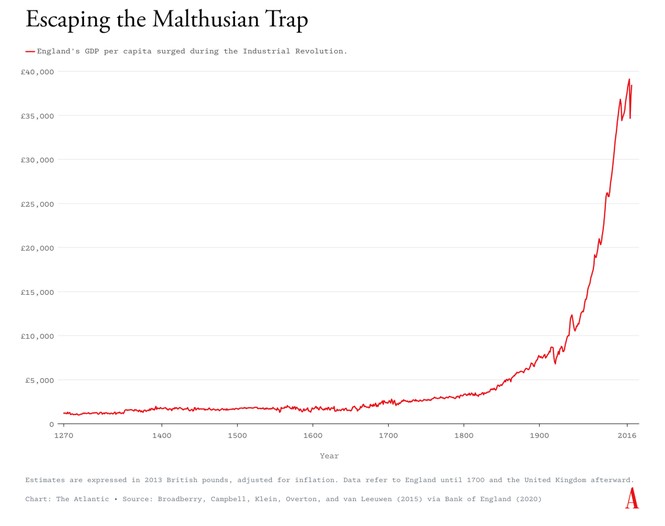The Illiberal Right’s Malthusian Bid for the Presidency
7 min read
Donald Trump and J. D. Vance have a story to sell you: Amid a scramble for housing in the United States, the real problem is the presence of immigrants.
Americans “cannot ignore the impact that the flood of 21 million illegal aliens has had on driving up housing costs,” Trump argued at the Economic Club of New York’s luncheon in September. Vance has made this argument even more fervently—on X, in recent interviews, and in other venues. During the vice-presidential debate, Vance declared that “25 million illegal aliens competing with Americans for scarce homes is one of the most significant drivers of home prices in the country,” adding, “It’s why we have massive increases in home prices that have happened right alongside massive increases in illegal-alien populations under Kamala Harris’s leadership.”
Key elements of this story are false. For one thing, the number of undocumented immigrants in the United States is likely about 11 million, less than half of Vance’s estimate. Furthermore, when the economist Ernie Tedeschi compared places that experienced a surge in foreign-born populations with places that saw large increases in housing prices for native-born Americans, he couldn’t even find a simple correlation. But Trump and Vance correctly understand one thing: Making the American public believe that immigrants are drawing down limited resources is an effective way of bringing out illiberal sentiments that could fuel the GOP ticket’s victory.
Let’s get a couple of things out of the way right now: Housing is scarce in big, liberal, productive cities such as San Francisco and Boston, which have generated high-paying jobs but refused to build enough housing to accommodate all the new workers. And if 25 million people suddenly vanished from the United States, pressure on home prices and rents would abate somewhat, all things being equal.
But all things wouldn’t be equal. The kinds of events that crush housing demand—such as collapsing birth rates, a massive recession that wipes out many workers’ incomes, a virus that kills a tenth of the population, and, yes, the sudden expulsion of tens of millions of undocumented immigrants—tend to have traumatic consequences, economic and otherwise.
What makes arguments like Trump and Vance’s seem plausible is a widespread failure to think in terms of systems. In reality, immigrants are not just consumers of housing; they’re also consumers of various other products, stimulating demand for more jobs for all Americans. And, of course, immigrants are not only consumers but also producers who help build housing and contribute to technological innovation.
Yet the fear of fighting over a fixed pool of resources runs deep in human thinking. In 1798’s An Essay on the Principle of Population, the English economist Thomas Malthus warned that population increases would impoverish everyone: “The food therefore which before supported seven millions must now be divided among seven millions and a half or eight millions. The poor consequently must live much worse, and many of them be reduced to severe distress.”
The tendency to turn against outsiders in the face of critical shortages is not restricted to a basket of deplorables. It’s in all of us. Most people see others as a threat to their resources, whether it’s immigrants coming for your housing, yuppies pushing up rents, other students taking slots at all the good schools, or just more people on the road, adding to congestion.
A recent poll in Massachusetts—which in 2020 supported Joe Biden over Trump two to one—revealed that many people are convinced by Trump/Vance illiberalism. A plurality (47.2 percent) agreed with the statement “Migrants are taking up affordable housing that should go to Americans first.” Trump’s rhetorical skills aren’t what’s turning significant numbers of Massachusetts liberals against their own principles. They are witnessing scarcity conditions that have been perpetuated for decades by their state’s Democratic policy makers.
The mismatch between job and housing creation across the wealthiest blue states caused prices to skyrocket, led some people to forgo good jobs because housing was too expensive, and strained entire communities, turning neighbor against neighbor. Unwittingly, liberals have seeded the conditions for illiberal politics to take root in some of the most progressive jurisdictions in the country.
There are fundamentally two ways to respond to scarcity. There is Malthusian thinking—a fierce defense of the existing resource pool, a politics that demands ever more scapegoats and leaves everyone poorer in the long run. Then there is liberalism, which demands a growing pie. It argues that we can make more: more housing, more schools, more good jobs, enough for everyone.
This wasn’t always possible. Scarcity used to be the depressing fact of human existence. Malthus was looking back at an era of human history during which GDP per capita was extremely low and population growth meant strain on existing resources, eventually leading to population decline. It was a horrible, depressing cycle that pitted family against family, tribe against tribe. There really wasn’t enough food to feed everyone, or enough energy to warm everyone. Rising populations meant new mouths to feed; new mouths to feed meant declining living standards for all.

But the Industrial Revolution changed all of that. In the late 17th and early 18th century, economies such as England’s began to escape the Malthusian trap. A burst of productivity and economic growth outpaced the growth in new people. New people weren’t just new mouths to feed; they were positive-sum additions to society. Even as the population grew exponentially, GDP per capita continued rising, lifting people out of poverty. People learned how to make more food with fewer resources (steam engines!), built structures that could house more people with less land (density!), and created technologies that could move lots of people around quickly (horse-drawn omnibuses on rails! cable cars! automobiles!). In a world of soaring economic growth, population growth no longer implied self-sacrifice. Welcoming newcomers with open arms no longer required a messianic level of magnanimity. A politics based on tolerating others, even celebrating others, became possible.
The political logic of tolerance works only once society is out of the scarcity trap. Anti-immigration hawks insist on zeroing in on increased short-term demand for housing because of immigration. They refuse to zoom out and see the whole picture: American economic growth is predicated on higher levels of immigration. According to the National Foundation for American Policy, “International migrants were the sole source of growth in the U.S. working-age population in 2021 and 2022 … A shrinking working-age population can easily lead to economic stagnation or even falling standards for a nation.” Fewer people mean less innovation, fewer goods and services produced, and higher prices and shortages. Yet liberals have forgotten the central importance of fighting against scarcity, and the logic of Malthusian thinking has crept back in.
In the world’s wealthiest country, scarcity is now a choice. There are no technological barriers to building enough housing for all. We know how to build homes; we’ve done it before. But I fear liberals have forgotten that their desire for a more welcoming, inclusive world rests on society’s ability to prove there is enough to go around. We cannot rely on altruism to redistribute resources to the most needy, to provide more for the poor, to pursue egalitarian principles. We live in a fallen world. People need more than abstract ideals; they need to feel secure.
Tensions rose during the pandemic, as home-price growth shocked expensive suburbs and sleepy towns alike. Graffiti in Boise, Idaho, telling newcomers to “Go back to Cali” reflected the frustrated mood of longtime residents as big-pocketed Californians moved in. But scarcity doesn’t just aggravate differences; it also creates them. When I report on homelessness, I hear people argue that unhoused residents are being bused in from out of state, a myth researchers have worked tirelessly to debunk—one comprehensive study showed that 90 percent of homeless people in California had lost their last housing in the Golden State. Most of the remaining 10 percent had been born there or had familial or employment ties to the state.
Rhetoric like Vance and Trump’s tends to resonate with people who assume that they’re the ones defending against interlopers—that the outsider will always be someone else. But history reminds us that stranger has never been a fixed concept. During the Great Depression, California passed an anti-migrant law targeted at Oklahomans and other Americans fleeing the Dust Bowl, making it a crime to “knowingly assist a pauper in entering the state.” How confident are you that no economic or natural disaster will strike your community? No recession? No hurricanes? No wildfires? If you’d like to gamble on that, lead the way. But the best hedge against future catastrophes is investing in liberalism and growth today.
Still, it’s not enough to simply expect better of people. Liberalism has to provide real, tangible proof that it can combat scarcity. Otherwise, people will do what’s natural. They’ll do what their ancestors did, and what Trump and Vance are enticing them to do: They’ll turn against outsiders. And once they’ve run out of outsiders, they’ll turn against one another.



